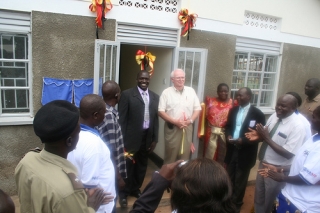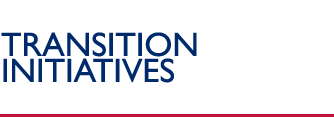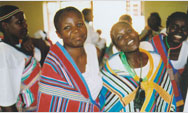USAID/OTI Uganda Quarterly Report
January - March 2009
Program Description
The Northern Uganda Transition Initiative (NUTI) is a three-year post-conflict transition program working in the four districts of north-central Uganda in the Acholi sub-region. This region was hardest hit by the 23-year insurgency and, as a result, experienced massive internal displacement, high levels of abductions, and significant levels of infrastructure destruction.
Since a 2006 peace process and a subsequent military offensive against the remnants of the Lord's Resistance Army (LRA) in Garamba National Park in the Democratic Republic of the Congo, the security situation in northern Uganda has dramatically improved. Displaced people numbering in the hundreds of thousands have begun to return to their villages of origin to plant their fields and start rebuilding their lives. To facilitate the return process and promote a lasting peace in the region, OTI launched the U.S. Government's flagship transition program in northern Uganda.
The overall goal of the OTI program is to encourage and support the voluntary return of displaced northern Ugandans by increasing their confidence in the government and in the ongoing transition process. To support this goal, OTI focuses on the following objectives:
- Increase access to information on peace, recovery, and development issues in northern Uganda through support to the media and strategic communication initiatives;
- Increase the visibility of, and confidence in, all levels of government through the delivery of targeted, strategic interventions; and
- Provide support for truth and reconciliation processes.
Country Situation
Returns Increase – The return rate for displaced people in northern Uganda has steadily increased, as a relatively stable security situation has prevailed. Returns in Kitgum, Pader, and Gulu Districts are over 75 percent, with only Amuru lagging behind, owing to a lack of infrastructure and government services in the district's villages.
The returnees are having a positive effect on the region. Crop yields are rising, reducing dependence on the international community and increasing the sense that the transition is taking hold. However, there are concerns that, because of the lack of Government of Uganda (GOU) facilities in return areas, levels of preventable disease, malnutrition, and school abandonment will increase. The lack of GOU presence could lead to a worsening situation in northern Uganda in the short term, until the GOU and donor projects can transition programming focus from emergency responses to reconstruction and development efforts.
As people have returned to their former homes, conflict over land has emerged as a major challenge. Displaced people have returned to find others on their land, to find that the land has been sold, or to find that they are unable to demarcate property lines because boundary markers have been destroyed.
OTI Highlights
A. Narrative Summary
OTI shifted into high gear this quarter. The NUTI team has been fully staffed, and the program is fully operational. Hires during the quarter included an operations manager and the fourth PDO team. The fielding of a complete staff corresponded with the extension of program operations into Kitgum District, where several activities were carried out in support of district priorities.
Continuing with its strategy to maximize small-grant impact in return areas, the NUTI team selected three additional sub-counties for activities-Purongo and Pabbo in Amuru and Agoro in Kitgum.
B. Grants Activity Summary
| Media |
7 |
$314,824 |
| Confidence |
17 |
$646,278 |
| Reconciliation |
4 |
$205,162 |
| Total |
28 |
$1,166,264 |
C. Indicators of Success
The OTI program continues to be the flagship transition program for the U.S. Government in northern Uganda. The U.S. Embassy and USAID Mission are highly appreciative of OTI's flexibility and the operational nature of its ground-level programming.
Re-targeting/Flexibility – OTI has continued to flexibly target opportunities when they are presented. The program is working with, and serving as a foundation for, other USAID Mission programs. OTI has developed a new cluster approach to link up and find synergies between OTI and other related USAID Mission activities in northern Uganda. The USAID Collaboration cluster is tracked in OTI's monitoring system to ensure coordination with other USAID Mission programs. The program has also been flexible in developing initiatives that serve as learning experiences for the broader mission and the development community. Such activities have included construction of teacher housing as well as market creation and pilot water projects.
 |
| OTI Africa Team Leader John Rigby inaugurates the Purongo Sub-County administrative offices. |
Speed – OTI has demonstrated its speed on three occasions in the past three months. First, the program responded to a request from Invisible Children, a nongovernmental organization, to support their annual advocacy event. A second response to a request for quick assistance went to the Kitgum District Government, which sought support for a working session to harmonize PRDP matrices. Finally, the program responded within one-day to the Gulu District Government's request for support for a nationwide sports competition. The event, which had not taken place in Gulu since the 1970s, provided the region with an opportunity to demonstrate that it is open for business.
Resource Leveraging – This quarter has been characterized by intense negotiation with the Mission regarding the NUDEIL program, which is OTI's exit strategy.
Program Review – During the week of February 2, the OTI Africa Team Leader and the Africa Program Manager visited Uganda. The regional leaders had an opportunity to participate in weekly meetings, field visits, and a day-long program review on February 5. The program review was very successful, with the team endorsing the approach to the transition. During the review, the program's first objective was modified to better capture the true intent of media programming in the North.
Program Appraisal
The OTI program remains focused and heading in the right direction. The survey received in late March indicated that NUTI projects are focused on issues of concern to the population and that interventions are well targeted. A challenge to implementation is assuring that spending keeps up with commitments, especially since "hard" rehabilitation activities take longer to implement than "softer" initiatives.
NUTI is working to maintain an appropriate balance between hard and soft initiatives. While keeping rehabilitation activities moving forward and retaining quality are paramount, it is also important that partners understand that it is not simply the finished building that makes a difference. The process—the buy in, the community participation—is central to the restoration and revitalization that is being delivered through these activities.
Next Steps/Immediate Priorities
Priorities for the next three months include the following:
- Selecting an additional seven sub-counties in northern Uganda for activities, evaluating possibilities using criteria that include return rates, presence of development plans, and level of community engagement;
- Deepening reconciliation activities by adding another component to the cleansing ceremonies—namely, wang oo, or community fireside chats; and
- Expanding programming into Pader District while keeping programs ongoing in the other areas.
For further information, please contact:
OTI/Uganda Contact: Megan Mamula, Uganda Program Manager, (202) 712-4168, mmamula@usaid.gov.
|




